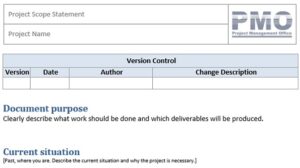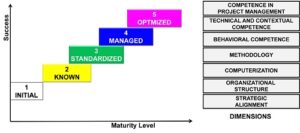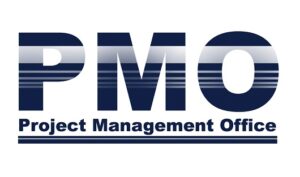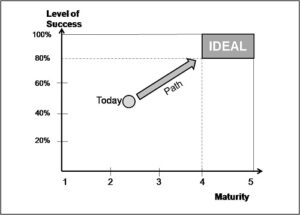The article “The Revolution of Artificial Intelligence in Project Management” explores how AI is transforming project management by enhancing efficiency, accuracy, and decision-making. It highlights the integration of AI features such as predictive analytics, task automation, and resource optimization in modern software. The article also discusses how AI-driven tools help project managers anticipate risks, allocate resources more effectively, and improve overall project outcomes, making project management more streamlined and data-driven.
Introduction to Artificial Intelligence in Project Management
Imagine a world where project management is not just easier, but smarter. Artificial Intelligence (AI) is making this a reality, transforming how projects are managed across industries. It’s not just about automating tasks; it’s about redefining the entire management process.
AI brings a host of powerful features to the table. From predictive analytics that enhance planning and forecasting to task automation that frees up valuable time, the benefits are clear. These features work together to boost efficiency and precision, enabling project managers to focus on what truly matters.
As we delve deeper into the role of AI, you’ll see how it’s reshaping project management into a more streamlined and data-driven discipline.
Predictive Analytics Enhancing Planning
Picture this: You’re planning a family vacation. You want everything to go smoothly, so you start predicting potential hiccups like flight delays or weather changes. Now, imagine having a tool that does this for your projects. That’s where predictive analytics comes in.
Predictive analytics involves using historical data and sophisticated algorithms to forecast future outcomes. In project management, this means anticipating challenges before they arise. Ever wondered how some projects manage to stay on schedule despite unforeseen hurdles? The answer lies in predictive analytics.
By analyzing past project data, AI can identify patterns and trends, helping project managers make informed decisions. This leads to more accurate planning and forecasting, reducing the likelihood of surprises that can derail a project. Imagine knowing ahead of time when a project’s resources are likely to be stretched thin or when a deadline might slip. Predictive analytics transforms guesswork into strategic foresight.
With these insights, project managers can allocate resources more efficiently and devise contingency plans that keep projects on track. Isn’t it time to let AI help you see the future?
Task Automation: Let AI Do the Heavy Lifting
Imagine having a magical assistant who handles all the mundane tasks while you focus on the exciting parts of your project. Sounds dreamy, right? Well, thanks to AI, this is now a reality in project management!
AI is revolutionizing the way we work by automating repetitive tasks, freeing up valuable time for project managers to concentrate on strategic decision-making. No more getting bogged down in the nitty-gritty details.
Here are some tasks that AI can effortlessly manage:
- Scheduling meetings and sending reminders
- Tracking project progress and updating timelines
- Generating regular status reports
- Managing emails and sorting through communications
By taking over these routine tasks, AI allows project managers to focus on what really matters—leading their teams to success. So, why not let AI handle the heavy lifting and make your work life a little lighter?
Optimizing Resources with AI
In project management, efficient resource allocation can make or break a project. This is where Artificial Intelligence steps in as a game-changer. AI tools analyze data to allocate resources more effectively, ensuring that teams have what they need when they need it.
Without AI, resource allocation often relies on manual processes and guesswork. This can lead to underutilization or over-allocation of resources. AI, however, offers a data-driven approach that optimizes the use of personnel, time, and materials.
| Resource Allocation | Without AI | With AI |
|---|---|---|
| Personnel | Manual scheduling | Automated, data-driven scheduling |
| Time | Fixed timelines | Adaptive timelines based on real-time data |
| Materials | Estimated needs | Accurate predictions and adjustments |
The impact on project outcomes is significant. AI-driven resource allocation leads to improved efficiency and reduced waste, ultimately enhancing project success. Teams can meet deadlines more consistently, stay within budget, and deliver higher quality results. It’s a win-win situation for everyone involved.
Anticipating Risks with AI
In the dynamic world of project management, anticipating risks can be the difference between project success and failure. Artificial Intelligence plays a pivotal role in risk management by identifying potential threats before they become critical issues. Imagine a project manager named Sarah, who was overseeing a large construction project. Thanks to AI-driven risk prediction tools, she received alerts about potential supply chain disruptions due to upcoming weather conditions. Armed with this foresight, Sarah was able to adjust the project timeline and secure necessary materials ahead of time, saving the project from costly delays.
AI systems utilize vast amounts of data to predict risks across various areas, such as:
- Supply chain disruptions
- Budget overruns
- Resource shortages
- Compliance issues
By analyzing historical data and current trends, AI provides project managers with a comprehensive view of potential risks. This proactive approach empowers them to make informed decisions, ensuring smoother project execution and enhanced outcomes. As AI technology continues to evolve, its ability to predict risks will only get sharper, further revolutionizing the way projects are managed.
Improving Decision-Making
Have you ever wondered how project managers make those crucial decisions that keep projects on track? The answer increasingly lies in the power of Artificial Intelligence. AI significantly enhances decision-making processes by providing managers with actionable insights derived from vast data sets. According to a McKinsey report, companies that leverage AI for decision-making are 23% more likely to outperform their competitors in terms of profitability.
AI enables data-driven decisions by analyzing historical data, current project metrics, and future trends. It sifts through information that would be overwhelming for humans, identifying patterns and predicting outcomes with remarkable accuracy. For instance, an AI-driven tool could suggest reallocating resources to a project phase that is lagging, ensuring that timelines and budgets remain intact.
With AI, decision-making becomes not just about intuition but about informed choices supported by data. This shift transforms project management into a more predictable and efficient process, allowing managers to focus on strategic tasks that drive success. As AI continues to evolve, its role in decision-making will only deepen, promising even greater accuracy and efficiency.
Streamlining Project Management
In today’s fast-paced world, Artificial Intelligence is a game-changer for project management, making processes more streamlined than ever before. By automating and optimizing various components, AI allows project managers to focus on what truly matters—driving projects to success.
AI takes the manual legwork out of many project management tasks, ensuring smoother operations and freeing up valuable time. Here are some processes that have been significantly streamlined thanks to AI:
- **Task scheduling and prioritization:** AI tools can automatically arrange tasks based on deadlines and resource availability, ensuring that the most critical tasks are completed first.
- **Resource allocation:** By analyzing project requirements and team capabilities, AI helps allocate resources where they’re needed most, reducing waste and improving efficiency.
- **Progress tracking:** AI systems provide real-time updates and insights into project progress, enabling managers to make informed decisions quickly.
With these streamlined processes, project managers can enjoy a more efficient workflow, minimize errors, and achieve better project outcomes. As AI continues to evolve, its ability to simplify project management will only increase, offering even greater benefits for teams worldwide.
Data-Driven Project Management
In the realm of project management, data is the compass that guides decision-making and strategy. The right data ensures that projects are on course, deadlines are met, and resources are used efficiently. However, the real magic happens when AI steps in to enhance data collection and analysis, turning raw numbers into actionable insights.
Consider a project manager named Lisa who once relied heavily on spreadsheets and manual updates. With AI-powered tools, Lisa can now access real-time data analytics that provide a comprehensive view of her project’s status. This shift has transformed her approach to managing her team and resources.
| Aspect | Traditional Management | Data-Driven Management |
|---|---|---|
| Data Collection | Manual and Time-Consuming | Automated and Real-Time |
| Decision Making | Based on Gut Feelings | Supported by Data Insights |
AI’s role in data collection and analysis is pivotal, enabling project managers like Lisa to make informed decisions swiftly. As AI continues to evolve, the potential for even more refined data-driven strategies is limitless, making project management not just efficient, but also smarter.
Real-World Applications
Artificial Intelligence is no longer just a buzzword; it’s becoming a cornerstone in project management. Many companies are leveraging AI to streamline their processes and achieve remarkable success. Let’s dive into some real-world examples that showcase AI’s transformative power.
- Microsoft: By integrating AI into their project management tools, Microsoft has enhanced predictive analytics capabilities, allowing project managers to foresee potential bottlenecks and allocate resources more efficiently.
- IBM: Known for its AI prowess, IBM utilizes AI-driven project management solutions to improve task automation, significantly reducing the time spent on repetitive tasks and increasing overall productivity.
- Siemens: This engineering giant uses AI to optimize resource allocation across its extensive project portfolio, resulting in more timely project completions and reduced costs.
Consider the story of a mid-sized tech company that adopted AI-powered project management software. Initially, their teams struggled with project delays and resource mismanagement. However, after implementing AI solutions, they noticed a 30% increase in project efficiency and a significant reduction in unforeseen risks. This success story highlights the profound impact AI can have on organizations, paving the way for data-driven and efficient project management practices.
Common Questions About AI in Project Management
As AI continues to reshape project management, many questions arise. Let’s address some of the most frequently asked questions and clarify common misconceptions.
Q: Can AI replace project managers?
A: No, AI is a tool designed to assist project managers, not replace them. It enhances efficiency by handling repetitive tasks, allowing managers to focus on strategic decision-making.
Q: Is AI integration expensive?
A: While initial costs can be significant, AI integration often leads to long-term savings through improved efficiency and resource optimization.
Q: Does AI guarantee project success?
A: AI doesn’t guarantee success but provides valuable insights and predictive analytics that can significantly enhance planning and execution.
Q: Will AI make project management too data-driven?
A: AI promotes data-driven decisions, but it also allows for flexibility and creativity, enabling managers to blend data insights with human intuition.
Understanding these aspects can help project managers embrace AI as a powerful ally in navigating the complexities of modern project management.
The Future of AI in Project Management
Have you ever wondered what the future holds for AI in project management? It’s an exciting time as AI continues to evolve and integrate deeper into our daily workflows. Predictions suggest that AI will play an even more crucial role in strategic planning and execution.
In the near future, we can expect AI to offer real-time insights and recommendations, transforming how decisions are made. Imagine an AI system that not only identifies potential risks but also suggests specific strategies to mitigate them. This level of sophistication would allow project managers to preempt challenges and streamline processes even further.
Additionally, advancements in natural language processing could revolutionize communication within teams. AI might soon enable seamless interactions through voice commands and chatbots, making collaboration more intuitive and efficient.
As AI technology continues to advance, it holds the promise of making project management more adaptive and predictive. By harnessing these tools, project managers can look forward to a future where projects are not only managed but optimized for success. Embracing these advancements may very well be the key to staying ahead in an ever-evolving landscape.
Benefits for Project Managers
Imagine a project manager, Alex, juggling multiple tasks, tight deadlines, and resource constraints. In such scenarios, AI tools become invaluable allies. They offer a range of benefits that simplify and enhance project management.
- Increased Efficiency: AI automates repetitive tasks, freeing up time for managers to focus on strategic planning.
- Enhanced Accuracy: By minimizing human error, AI ensures more precise project tracking and reporting.
- Improved Resource Allocation: AI analyzes data to optimize resource use, ensuring projects stay on budget.
- Proactive Risk Management: AI anticipates potential risks, allowing managers to address issues before they escalate.
For Alex, these benefits translate into a smoother workflow, enabling better decision-making and more successful project outcomes. Embracing AI not only alleviates daily pressures but also empowers project managers to lead with confidence and foresight.
Challenges and Ethical Considerations
As AI continues to transform project management, it’s important to address the potential challenges and ethical considerations that come with its integration. While AI offers numerous benefits, its implementation is not without hurdles.
- Data Privacy: Ensuring that sensitive project data is protected and not misused.
- Cost of Implementation: High initial costs and resource investment required for AI integration.
- Complexity of Technology: Navigating the complexity of AI systems can be daunting for some organizations.
- Resistance to Change: Adapting to new technology can be met with resistance from team members.
On the ethical side, there’s a lively conversation about the role of AI in decision-making. Should machines make decisions that affect people’s jobs and careers? There’s also the question of bias; AI systems are only as unbiased as the data they are trained on. It’s crucial to ensure that these systems are fair and do not inadvertently perpetuate discrimination.
These challenges and ethical considerations remind us to tread thoughtfully, ensuring AI’s role in project management is responsible and beneficial for all stakeholders.
Conclusion: Embracing AI in Project Management
Artificial Intelligence is undeniably reshaping the landscape of project management. By integrating features like predictive analytics, task automation, and resource optimization, AI empowers project managers to enhance efficiency, accuracy, and decision-making processes. These advancements lead to more streamlined and data-driven project management.
As we look to the future, it’s clear that embracing AI can offer significant advantages. The potential for improved project outcomes and risk management is immense. Now is the time for project managers and organizations to harness the power of AI, turning these possibilities into reality.
Start exploring AI-driven tools today and see how they can revolutionize your project management approach. The future is bright, and the opportunities are endless.
Must-Reads to Deepen Your Knowledge
SABAE, K, Artificial Intelligence in Project Management Kindle Edition, 2024.





